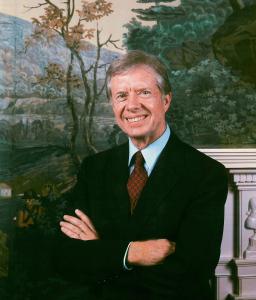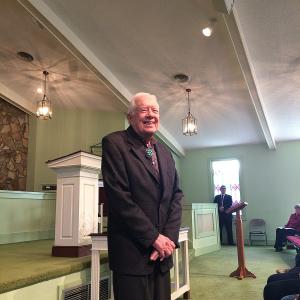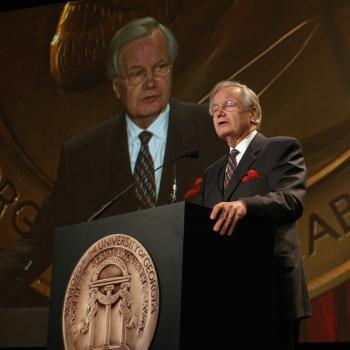
America chose one of the most devout Christians to ever become president of the United States in 1976. As we prepare to lay President Jimmy Carter to rest on Jan. 9, we should recognize and honor him for a life well-lived and a faith for the ages.
Looking at today’s political landscape, it seems highly unlikely that Americans will elect a morally upright person like Jimmy Carter to high office anytime soon. Voters either cannot tell the difference between honesty and dishonesty, or they simply don’t care about candidates’ character.
Either way, Americans are throwing away America’s experiment with democracy and turning their backs on values the nation once cherished. It makes no sense.
At the time Carter first ran for president in 1976, a presidential candidate’s faith was barely mentioned other than John F. Kennedy’s Catholicism in 1960. But Carter was quite open about the importance of God in his life. Voters knew he had a strong Christian faith when they elected him, but they may not have been aware of the depth of his commitment.
Then suddenly on Jan. 20, 1977, America had a new president who was a born-again Christian. He had a faith that few leaders can match. It was a faith for the ages. That isn’t to say his opponent, incumbent president Gerald Ford, wasn’t a good and decent man. I believe he was, but he didn’t seem to have Carter’s faith.
Inextricably Entwined
Carter, who died at age 100 on Dec. 29, once explained that his faith was “inextricably entwined with the political principles” he had adopted. And it showed.
“…. his faith taught him that a clear conscience was always preferable to Machiavellian expediency – a pretty healthy attitude that proved both Carter’s greatest strength and his bane,” said historian Douglas Brinkley in the late 1998.
“Machiavellian expediency” has been defined as behavior that’s unscrupulous, deceptive and cunning especially in politics. Niccolo Machiavelli, a 16th century Italian philosopher, justified the behavior associated with his name in a treatise called The Prince. In it, Machiavelli argued that the end justifies the means.
It’s a philosophy that many American politicians have adopted without thinking about it twice.
Important Achievements
As president, Carter blended liberal social values with fiscal conservativism. His greatest achievement from a political standpoint was the peace agreement – called the Camp David Accords – that he brokered between Israel and Egypt in 1978.
The agreement holds firm to this day and is considered one of the most important diplomatic achievements of the last century, according to various sources. And President Carter deserves all the accolades he received for his role in making it happen and for all of the lives saved as a result.
But Jimmy Carter deserves credit for other accomplishments as well:
- Creating the U.S. Department of Energy to deal with energy shortages, which were a crisis-level problem at the time. The new department also dealt with energy conservation and research into renewable energy, among other things. Energy is vital to the U.S., and cabinet-level attention to it was and is entirely appropriate.
- Establishing the Department of Education in 1979. The department’s mission was to improve the quality of education and centralize education policy. American children in every county and state deserve good educations. They will need all the knowledge and skills possible to compete for good jobs in the world market, and President Carter wanted to help prepare them — all of them.
- Championing human rights for all people, especially women and minorities. Carter’s book A Call to Action: Women, Religion, Violence, and Power, published in 2014, called religious organizations to task for their lackadaisical attitude toward violence against women. It was “the human and civil rights issue of our time,” the former president said.
Jimmy Carter was especially critical of men who hold powerful positions in religious organizations and use their power to control and abuse women. He also slammed people who twist Scripture and allow serious abuses to exist in religious organizations. (Read more about misogyny in the Southern Baptist Convention here.)
A Shining Post-presidency
Carter’s post-presidential achievements outshine those of every other former president in recent memory. We should honor him for the following:
Establishing the Carter Center:
The former president, along with Mrs. Carter, created the center to promote democracy and improve healthcare around the world. He received the 2002 Nobel Peace Prize “for work to find peaceful solutions to international conflicts, to advance democracy and human rights, and to promote economic and social development,” according to the White House.
Writing more than 30 books:
Carter was a prolific writer who wrote books about wide-ranging topics such as:
- Faith: Our Endangered Values: America’s Moral Crisis, Sources of Strength: Meditations on Scripture for a Living Faith and Faith: A Journey for All among others
- World politics: The Blood of Abraham: Insights into the Middle East and Palestine: Peace not Apartheid among others
- His life: A Full Life: Reflections at Ninety and others.
“In a very craftsman-like and humble way, when he decided to write something new, he worked to learn that genre from the inside and dedicated some time to becoming as good at it as he could be, said historian Craig Fehrman, author of Author in Chief: The Untold Story of Our Presidents and the Books They Wrote.
“That’s the story of him as a writer, but I also think that’s a story about him as a human being,” Fehrman added. Again, Carter had a faith for the ages, and it came through in his writing.
(Former president Carter should receive extra credit for actually writing the 30+ books credited to him. By that, I mean thinking through and planning each book, researching his subject, putting his hands on a computer keyboard and actually writing sentence after sentence until he created coherent and thoughtful books. See a list of Carter’s books here.)
Volunteering at Habitat for Humanity:
The former president and Mrs. Carter were Habitat for Humanity volunteers from 1984 to 2019, when advanced age prevented further participation. During those years, they worked with some 104,000 other volunteers in 14 countries to build, repair and renovate nearly 4,400 homes, according to Habitat International. By shining a light on Habitat, they encouraged numerous other people to volunteer.
Teaching Sunday School classes:

Carter taught Sunday school and led Bible studies at Maranatha Baptist Church in Plains, GA., for several decades. He taught about twice a month and sometimes drew more than 500 people of various ages, races, sexual orientations and beliefs, according to AP. In comparison, only a handful of regulars attended when he didn’t teach.
Faith in Action
When Jimmy Carter first stepped on the international stage, many people didn’t know what to make of his southern Baptist way of thinking. They had never encountered anyone quite like him. He had a faith for the ages, and most people didn’t understand it at the time or now.
Some viciously ridiculed him and others laughed, but he held firm to his beliefs. To many, he was a poor dumb southerner who clung to superstitious beliefs. But he wasn’t dumb by any stretch of the imagination. And while some people embraced the New Age craziness that gripped the nation in the 1970s, many couldn’t accept Jimmy Carter’s religious beliefs.
“At least part of the stir over Carter’s shirtsleeve religiosity is that he seems to practice what he preaches,” Newsweek wrote at the time. The magazine’s disbelief jumps off the page at the reader.
During the 1976 presidential campaign, Carter told reporters that he prayed about 25 times a day – “maybe more” – and read the Bible at the end of every day. “It’s like breathing,” he explained. But the general population of Americans didn’t understand.
At the time, the nation was reeling from President Gerald Ford’s pardon of Richard Nixon over Watergate and recovering from that scandal, as well as the Vietnam War. The country needed a Jimmy Carter, according to Barbara Perry, director of presidential studies at the University of Virginia’s Miller Center.
“And so for him to come out of almost from nowhere to earn the nomination by sheer shoe leather in Iowa and New Hampshire, and to be the person outside of the establishment and to say, ‘I’m not from Washington, I will never lie to you, I’m a born again Christian’ – what I say is that, he really did bring a close to the Watergate period,” Perry said.
In His Own Words
Jimmy Carter’s last book was about faith, and it’s titled Faith: A Journey for All. “In this book, my primary goal is to explore the broader meaning of faith, its far-reaching effect on our lives, and its relationship to past, present and future events in America and around the world,” he wrote.
“The religious aspects of faith are also covered, since this is how the word is most often used…. I have included a description of the ways my faith has guided and sustained me, as well as how it has challenged and drive me to seek a closer and better relationship with people and with God.”
Another book by Carter — Endangered Values — made a compelling argument for separation of church and state, which is a constitutional right that “Christian” nationalists are attacking in 2025.
In Beyond the White House, he talked about the values that he said should characterize our nation and individual people such as “commitments to peace, justice, freedom, humility, forgiveness or an attempt to find accommodation with potential foes, generosity, human rights, fair treatment of others, protection of the environment and alleviation of suffering.”
These beliefs, he said, were inherent in all the great world religions. And sadly, they are becoming scarce in 21st century America. What has happened to the nation Jimmy Carter once led? Where has our moral compass gone? Can we ever regain what we have lost? I’m doubtful.
Another book by Carter, A Call to Action, addresses another serious problem in the U.S. — ongoing violence and discrimination against girls and women. “The most serious and unaddressed worldwide challenge is the deprivation and abuse of women and girls, largely caused by a false interpretation of carefully selected religious texts and growing tolerance of violence and warfare,” the former president wrote.
Carter also authored a book of daily devotions based on his Christian faith. And he wrote Sources of Strength based on 52 of his Sunday School lessons. “The Bible offers concrete guidance for overcoming our weaknesses and striving toward the transcendent life for which we were created,” he wrote. And in Sunday Mornings in Plains, a three-part audiobook series, Carter delved into adult Bible studies he led.
The “Me Decade”
But Americans, especially those who touted their so-called faith the loudest, did not know how to react when confronted by a true Christian in public life. Evangelicals turned away from him in 1980 and voted in large numbers for a once-divorced has-been film star. The Carters’ honesty, integrity and faith were replaced by hypocrisy, rampant consumerism and slick big-city, movie star values that Americans adored.
Carter once described America’s hypocrisy by saying the nation was experiencing a moral and spiritual crisis. He was right when he made the statement, and the situation has not improved. How else can you explain the recent election of an immoral narcissist who has no morals, decency or connection to God?
“In a nation that was proud of hard work, strong families, close-knit communities and our faith in God, too many of us now tend to worship self-indulgence and consumption,” Carter said. “Human identity is no longer defined by what one does, but by what one owns.”
In His Own Words
President Carter’s views about this nation deserve a second, third or fourth look at a time when hatred and violence have become a way of life and true faith is becoming a distant memory in America.
“My faith demands that I do whatever I can, whenever I can, for a long as I can,” he once said.
“You can’t divorce religious belief and public service. I’ve never detected any conflict between God’s will and my political duty. If you violate one, you violate the other.”
“It is a weak nation, like a weak person, that must behave with bluster and boasting and rashness and other signs of insecurity.”
And finally, candidate Carter said these words when announcing his run for the White House: “I would not tell a lie. I would not mislead the American people… and I would not betray your trust.”
What I wouldn’t give for leaders who had an ounce of Jimmy Carter’s integrity.
When CBS recently asked Chip Carter how his dad should be remembered, the younger Carter said he was “a beautiful human being who gave everything he could to his children and his country, and who made it a better place than when he found it. And you know, that’s about as good as it can get.”
Jimmy Carter really did have a faith for the ages.













